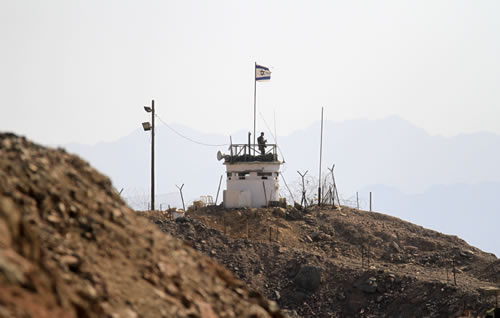![]()
Mon, Aug 6, 2012 | RubinReports | By Barry Rubin
One of the mantras from Israel’s supposed foreign well-wishers is that the country is now “isolated.” You can tell the hostile ones because they quickly add that this alleged isolation is Israel’s own fault.
Sure, on the surface the first proposition makes sense. Israel has lost its two main regional friends — Turkey and Egypt — which are now hostile. The United States under its current government — but doesn’t President Barack Obama love Israel? — is no longer reliable. Isn’t rather notable that despite these two countries turning totally against Israel this has had zero effect on the Obama Administration’s totally positive policy toward both, a list to which could be added the Hizballah regime in Lebanon mentioned above. Perhaps the U.S. election in November will change this situation but there’s nothing Israel can do about that.
Yet none of this is in fact Israel’s fault. The Turkish people elected and reelected a subtly Islamist regime that loathes Israel for reasons having nothing to do with Israel. The Egyptian people elected an openly Islamist regime that loathes Israel for reasons having nothing to do with Israel. The problem is the ideology of the rulers. And the same thing applies to the United States, doesn’t it? At least in Egypt the armed forces are holding back the Muslim Brotherhood.
Erdogan, al-Mursi, and Obama are not really reacting to some Israeli mistaken policy and the problems won’t be solved by more unilateral Israeli concessions. Indeed, given the dangers of the situation — and most Israelis appreciate this — such give aways are out of the question. Nothing Israel does will fix the problem and any retreats will make matters worse.
Nor is anything Israel does likely to move negotiations with the Palestinian Authority ahead by even an inch (or, if you prefer, a centimeter).
So the situation isn’t wonderful on the surface and anyone who reads the newspapers and develops great theories in his own mind can reach that conclusion.
Yet the following development, for example, is more important than all of the anti-Israel media articles and boycott campaigns of the last year put together: This week the European Union is offering Israel upgraded relations in 60 different areas, removing all obstacles against Israel having full access to European government-controlled markets and cooperation with nine EU agencies, including Europol and the European Space Agency.
But let’s look deeper, specifically at the situation immediately on Israel’s borders, to see if things are as bad as they might seem.
Lebanon: Neighboring Lebanon is governed by Hizballah and various clients of Syria and Iran. That’s not good. Yet let’s remember that Hizballah and its allies are now trembling over what might be the impending fall of their Syrian backer. How will they fare without the Damascus dictator behind them? A Sunni Muslim dominated Syrian regime might hate Israel but it will not love or help those who aided the government that was murdering them.
And the Lebanese government has another problem. It wants to consolidate control over Lebanon and rule the country. Fomenting a war with Israel that brings Israeli warplanes to destroy the country’s power plants, bridges, airport, and pretty much every other major infrastructural project will make Hizballah hated.
A Hizballah direct offensive against Israel is not in the cards.
By the way, people are forgetting the implications of blaming Hizballah for the terrorist attack in Bulgaria that killed five Israeli tourists. Hizballah is not some group hanging out in caves; it is the government of Lebanon. So will a U.S. government that has publicly blamed Hizballah for the attack actually take any action against Hizballah the government? Probably not but isn’t that a disgrace? Maybe after January 20 there will be someone in Washington DC who will recognize the rather bizarre contradiction in such behavior.
Then there’s tottering Syria. Israeli defense officials have pointed to the danger of jihadists operating in sections of Syria near the Golan Heights but no longer under the control of an overextended central government. True, Israel should be prepared for such a danger.
Yet the Golan border is well defended and closely watched. Terrorists are unlikely to be able to cross. As for a massive influx of Syrian refugees, why should they chance the minefields when they can more easily get out through Iraq, Lebanon, or Turkey? The long-run threat from a Sunni Islamist regime is real but then so is the discomfiting of an Iran deprived of its main ally. And Syria’s armed forces are going to be a mess for years to come. So once again this is an issue that must be taken seriously but is not all that menacing.
Let’s jump over to Egypt. Israel’s high priority is to build up its defensive forces along the border and complete the security fence there. Cross-border attacks are now a real problem. Yet they can be defended against. These attacks consist of terrorists firing across the border or advancing a very short distance into Israeli territory — mainly to fire on a single road that runs near the border — before they can be intercepted. For a real threat to exist, the situation would have to deteriorate considerably, with large terrorist units operating openly on Egyptian soil and being able to transport rockets from the Gaza Strip through miles of Egyptian territory. That could happen but we are nowhere near that point and such a scenario would mean that the Egyptian government and army were openly courting full-scale war.
As long as the army is still running Egypt, though, the danger of a major upsurge in cross-border assaults or, even worse, an attack on Israel from Hamas in the Gaza Strip that would be backed by Egypt is limited. Israel has time to prepare.
Israel’s number-one border problem remains the Gaza Strip. Hamas periodically fires mortars and rockets while trying cross-border ground attacks. Israel has gotten its ground defenses in good shape and has created a fairly effective anti-rocket system. This doesn’t make things more pleasant for citizens in that part of Israel and it is quite possible that a new war will break out in future, as happened in late 2008. Yet such a battle is not an existential threat of the type common from 1948 into the 1970s.
Regarding Jordan, the regime has survived the Arab Spring and is still committed to controlling the border, a task it has handled pretty well over forty years. Terrorism from the West Bank remains a constant threat but the fence has made it a lot harder. That’s why Israel ignores, and will continue to ignore, international criticism. Might there be a new intifadah some day? Yes, but not that soon, if only because the Palestinian Authority realizes that such a gambit risks Hamas using the violence to promote itself and kick out its nationalist rivals.
Now none of this is meant to be complacent. But it is important to understand that Israel starts off with a much higher threat level than that faced by other Western developed countries which consider almost any threat with trepidation. By Israeli standards the problems are manageable.
And that’s why the main efforts of terrorist groups are to attack Israeli citizens and installations outside the country’s borders. The chief of military intelligence has revealed that twenty such plots were broken up before the one in Bulgaria succeeded.
Israel’s “friends” abroad simply can’t seem to get out of their minds the idea that the country faces such terrible threats that it must make big concessions and beg for peace with the Palestinians on just about any terms, or try to appease hostile surrounding countries in order to stave off their wrath.
What they don’t — and at times don’t want to — understand is that the situation is the exact opposite. When forces are after you that want to wipe you off the map, you cannot depend on your “friends,” and know that no compromise solution is desired by the other side, that’s the time to look after your own interests and defense.
The overwhelming majority of Israelis across the political spectrum understand this. Consequently, it doesn’t matter at all that Western pseudo-experts, pundits, and politicians don’t. Being isolated from strategic reality is far more dangerous than being isolated because people don’t like you.



 RSS
RSS











Latest Comments
Hello Mike, Thank you for your positive feedback to the article. I felt there wasn’t too much critical analysis of ...
Thanks for this considered and well constructed article. A follow up article on the manner in which the editorial contro...
THE CLUELESSNESS OF CLAIMING THAT OBAMA'S MIDDLE EAST POLICIES WERE A FAILURE CANNOT BE FURTHER FROM THE TRUTH, WHAT THE...
As long as Obama is the president of the usa do not trust the us government......
Thank you for an good read....